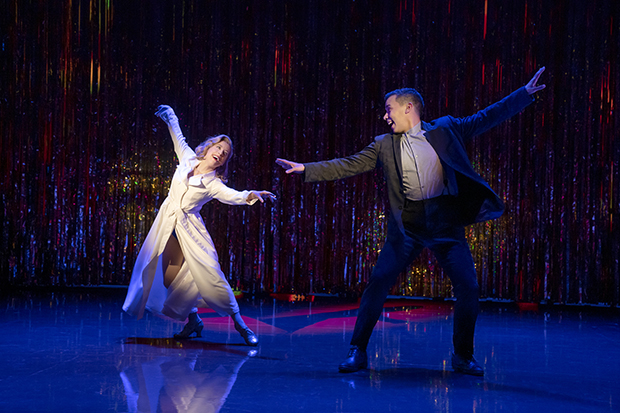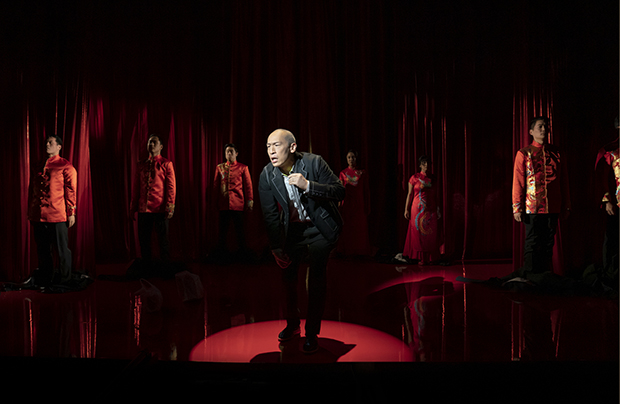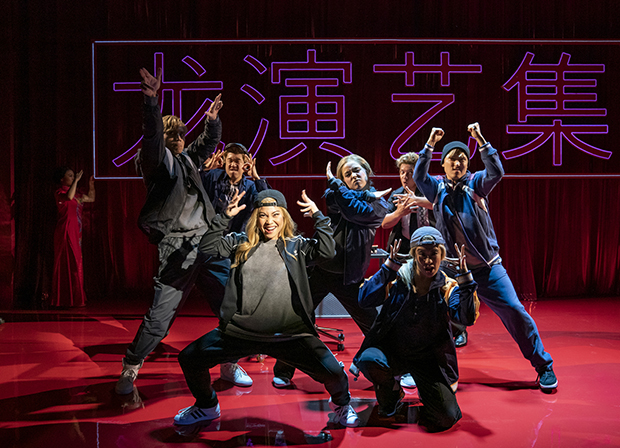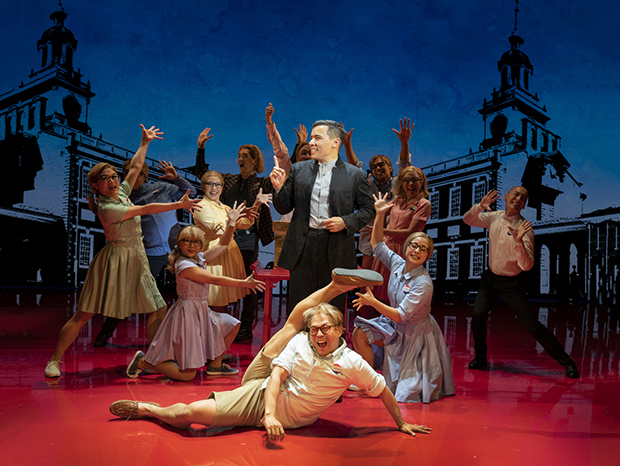Soft Power Imagines a Broadway Romance Between a Chinese Executive and Hillary Clinton

(© Joan Marcus)
Soft power is the influence a country projects through its culture and values. It's why Dwayne "The Rock" Johnson is one of the biggest stars in India, why the US prep Carol Morgan School is the most prestigious K-12 academy in the Dominican Republic, and why protesters occasionally wave American flags as they march through central Hong Kong. Paranoid autocrats in Beijing dismiss the latter as a product of CIA meddling, but this only betrays their addiction to hard power and inability to understand the world on any other terms. But there are limits to American soft power, just as there are drawbacks to Chinese technocratic dictatorship. In the trippy and undeniably entertaining new musical, Soft Power, the two systems perform an ecstatic polka, much like Anna and the King.
For a show that deals with geopolitics and competing systems of government, Soft Power comes from a surprisingly personal place. It was partly inspired by librettist David Henry Hwang's real brush with death: In 2015, he was randomly stabbed near his Brooklyn home. From that terrifying experience came a musical (with music and additional lyrics by Jeanine Tesori) about an American playwright named David Henry Hwang (Francis Jue) who is hired by Chinese entertainment executive Xūe Xíng (Conrad Ricamora) to adapt a beloved Chinese movie into an American-style stage musical. When creative differences threaten his involvement in the project, and when Hillary Clinton loses the 2016 presidential election, David thinks his life couldn't get any worse — then he gets stabbed in the neck.
The experience of leaving a third of his blood on DeKalb Avenue propels David into a delirious musical dream: In it, Xūe Xíng travels to the unruly and violent United States, where he falls in love with candidate Hillary Clinton (Alyse Alan Louis). Xūe tells Hillary that, were they in China (where leaders are chosen by the politburo), she would be president already (a compliment bound to reassure the few Trump voters in the audience). But is such reverence for ability enough to shake Hillary's faith in democracy?

(© Joan Marcus)
As you might have guessed, this show is nutso — in the most delightful way. Director Leigh Silverman gloriously synthesizes classic Broadway and contemporary Chinese sensibilities into one riveting spectacular, pushed over the top by Sam Pinkleton's dazzling choreography. Tesori delivers a score dripping with old-fashioned glamour instantly recognizable to American musical theater fans, but in service of an entirely different value system.
In one song, the Chief Justice (Jon Hoche, a Family Guy character brought to life) sings a patter song in the style of "Ya Got Trouble" (The Music Man) explaining the electoral college. In it, the mystical ballot box comes off like our oracle of Delphi, its wisdom unquestioned by our superstitious culture. In another number, reminiscent of "Do-Re-Mi" (The Sound of Music), Xūe and Hillary bond as he attempts to teach her how to pronounce his name.

(© Joan Marcus)
Hwang and Tesori co-opt familiar musical tropes to show American audiences what it is like to experience the exuberance of Broadway as an outsider. America is portrayed as a strange foreign land teeming with violent criminals and a few sympathetic native guides like Bobby Bob (an adorable Austin Ku). This is a country of blond-haired cowboys dancing to hip-hop and speaking in exaggerated Goodfellas accents, suggesting that our obsessively catalogued racial and ethnic taxonomy doesn't mean much to the Chinese observer.
Hwang's one major misstep comes at the top of the second act, which opens with a panel discussion set in Shanghai circa 2069, in which a group of Chinese academics discuss Chinese shūo chàngjù ("spoken and sung drama") and the primitive American folk art that preceded it. It's an unsubtle way to spoon-feed the audience the playwright's Big Idea. And after By the Way, Meet Vera Stark, Bootycandy, and The Low Road, it feels like an increasingly hoary cliché.
The show is much better when it sticks to classic Broadway showmanship refracted through a Chinese kaleidoscope. Silverman fashions this glittering fantasy through specific design choices: Clint Ramos's red-and-gold set finds tacky common ground between Chinese and American taste. Anita Yavich makes the stage sparkle with her flashy costumes. Lighting designer Mark Barton, sound designer Kai Harada, sound effects designer Bart Fasbender, and video designer Bryce Cutler collaborate to create a hallucinogenic experience, supercharging an already surreal story.

(© Joan Marcus)
Memorable performances from the three leads seal the deal: A traveler from our world, Jue is amiable in his direct address. Louis captures Hillary's unshakable optimism and tragically unfulfilled quest for the presidency, especially during a song in which she impressively belts with a gob of Breyers mint ice cream in her mouth. Ricamora is an appealing leading man who brings vulnerability to a character who betrays little weakness. Over the course of the show, Xūe's faith in the righteousness of the Chinese model is slowly replaced by aching doubt.
I left Soft Power wondering if it was even possible to extract the book musical from the liberal context in which it was developed, with the premium it places on self-reflection and interrogation of norms. This is the form that placed "Tradition" and "Do You Love Me?" in the same musical (Fiddler on the Roof). It begat "If You Could See Her" from Cabaret and "You've Got to Be Carefully Taught" in South Pacific. It produced both the Oklahoma! of 1943, and the one currently running on Broadway. Soft Power suggests that the musical has liberal democracy circulating through its veins — and that's a powerful thing.










